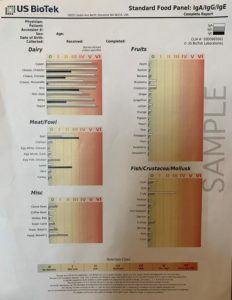Food Sensitivity Testing
Home » Food Sensitivity Testing
Food Sensitivity Testing
A food sensitivity is different from a food allergy. An allergy is an immediate response to a food particle mediated by Immunoglobulin E. These reactions happen quickly and often have severe symptoms. A food sensitivity happens when your immune system wrongly attacks a food particle after misidentifying it as a foreign invader. Since our immune systems are not designed to attack food this results in the attack spilling over onto the surrounding tissue. Symptoms of this include cramping, bloating, diarrhea, constipation, joint pain, fatigue, and headaches. These reactions can happen up to 72 hours after eating a food making it hard to connect a specific food to a negative reaction.
There are primary and secondary sensitivities. Primary sensitivities are ones that you are born with and will most likely always be present. The more you eat that food the stronger your reaction will be. It may be possible to eat that food in moderation depending on the state of your immune system. Secondary reactions are reactions that are present because of a food being in the same family as a primary reaction or due having a disproportionate amount of that food in your diet. These reactions can often be cleared and the food reintroduced to the diet.
A food sensitivity test is done by taking a blood sample and then introducing different foods to it and measuring immunoglobulin production. The amount of immunoglobulins produced help clarify whether it is a primary or secondary reaction and how long it has been present. There are several different testing options with regards to the number of different foods tested and which immunoglobulins to test. Dr. Talbitzer can help you understand your choices and provide advice on which combination of options fits your situation best.
After identifying which foods are reactive, a combination of food avoidance and nutraceuticals to promote healing in the gut are used. The goal of this treatment plan is to erase the damage caused by the reactions in your gut and to cause your immune system to “forget” that it was reacting to specific foods. After a period of time a reintroduction diet is performed to see which foods are can be eaten safely versus which ones may still be causing reactions.
Don’t let what you eat impact your overall health. If you think food is making you feel worse, come in for a consultation about your testing and treatment options.
- Allergy Relief (5)
- Autoimmune (3)
- Back Pain (7)
- Chiropractic (9)
- Food Info (3)
- Health Tips (9)
- Internal Medicine (13)
- MLS Laser (5)
- Nutrition (3)
- Office Information (2)
- Recipes (4)
- Testimonials (6)

